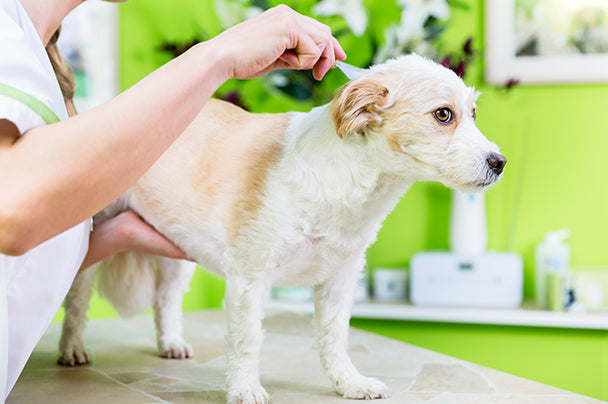
Fleas are tiny blood feeding insects, usually about the size of a sesame seed. Once you notice their presence in your house, they are tough to get rid of. And no wonder, fleas are hard and flat, making them difficult to squish. They can survive for months without feeding, and are capable of reproducing briskly laying up to 50 eggs a day. Flea infestation are especially serious in young kittens and pups and can put their life at risk .
Fleas prefer to snack and live on our furry friends. Bites from fleas can be very infuriating to pets. The problem with identifying flea bites, as opposed to other insect bites, or even common rashes is, they can all look and feel very alike. A simple way to detect the presence of fleas on your furries is to look out for 'flea dirt', black dust-like flea droppings visible on the pet's body. A flea comb can be used for this purpose
If you have seen fleas on your pet and suspect that they have fleas, here are a few tips to help you recognize the possibility of a flea bite and at the very least treat those irritating bites. Read along to find out more !
Why do flea bites itch?

During a feeding session, fleas release saliva containing an anticoagulant into your bloodstream. This increases the flow of blood, making it easier for the flea to feed. But when the flea is done feeding, it leaves small traces of saliva on your pets skin causing the skin around each bite to become sore and painful . Some pets develop allergic response to flea saliva causing Flea Allergy Dermatitis, a painful condition which causes itching and redness.
Treatment for flea bites:

- Avoid itching on the bites, which could cause infections and further irritation.
- Over-the-counter anti-itch creams, antihistamine medications or a simple and an effective all-natural and safe Reliflam spray from Pet Natural Remedies can be applied to the bite area on your pet.
- Giving your pet a lemon bath will keep your pet smelling fresh and noticeably flea free. Simply dilute half a cup of freshly squeezed lemon juice into two cups of water, then add a squeeze of your normal pet-friendly soap or shampoo for a natural way of treating fleas in dogs.
- Flea bites can heal on their own if left alone.
- And of course, seek the advice of a vet if symptoms persist.
How to prevent flea bites on your pets?

You can prevent flea bites by keeping your pets and home free of fleas. Use flea preventive on your pets like the all-natural and lick safe Reliflam spray from Pet Natural Remedies and keep your home clean and consider vacuuming pet areas regularly. It may also be necessary to consult a pest control specialist to get rid of fleas.
Fleas can proliferate rapidly and make your dog seriously ill. That's why it's important to check your dog for fleas on a regular basis and act quickly to eliminate any outbreaks that occur.

